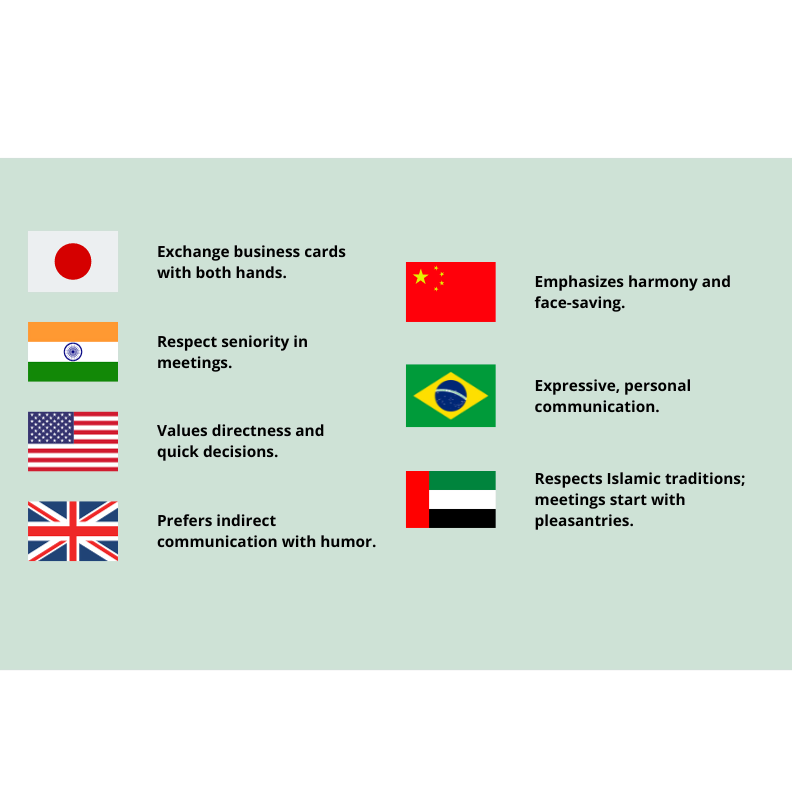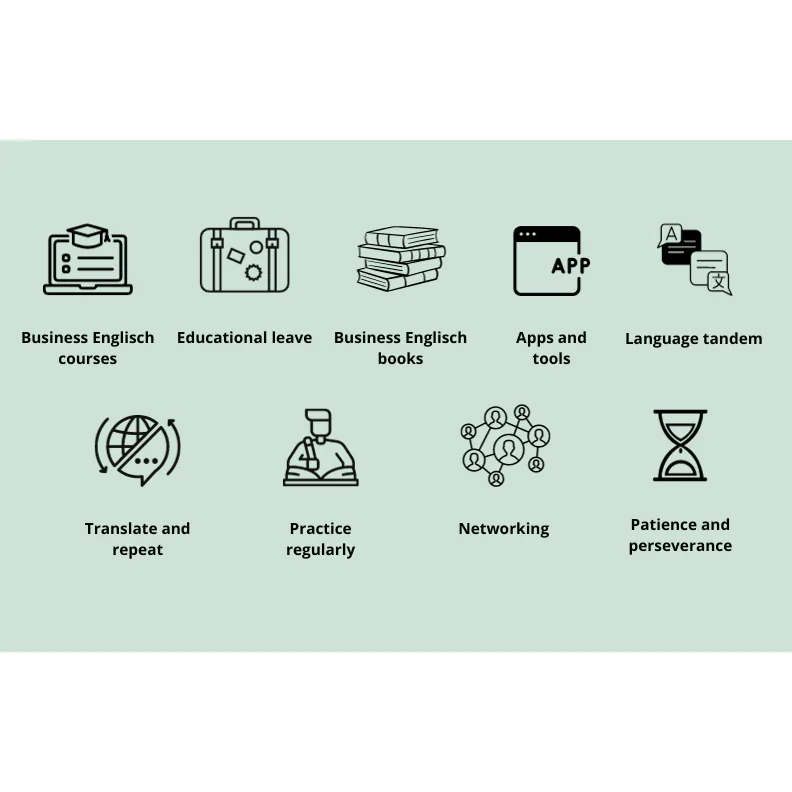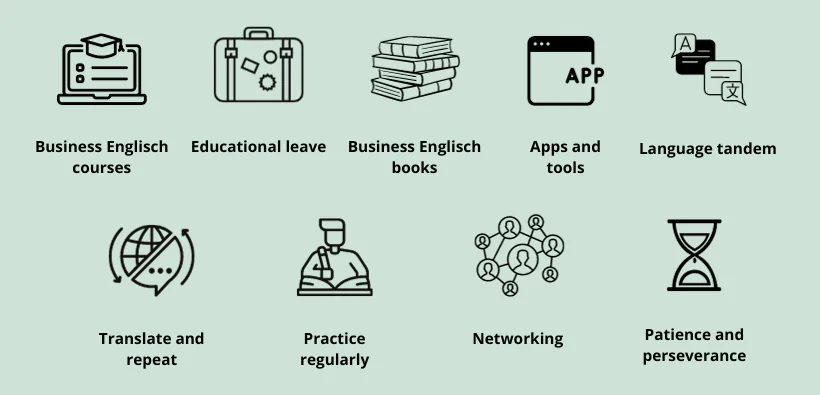Business English plays a crucial role in today's globalized world. At a time when companies operate across borders and international business relationships are becoming increasingly important, the ability to express oneself effectively in English has become an indispensable tool for professional success.
This article is dedicated to the importance of Business English and why this specialized form of communication is so relevant in the business world. From facilitating international collaboration to opening up new career opportunities, Business English is a key to unlocking full professional potential in a globalized economy.


How to Improve Your Business English Skills
1. Why Business English?
-
Professionalism:
Business English is more than just a language. It is a skill that highlights your professionalism in the business world. It shows that you are able to communicate effectively and accurately. -
Effective communication:
In the business consulting industry, clear communication is of utmost importance. Business English allows you to convey thoughts, ideas, and recommendations clearly and understandably. -
Global reach:
Companies increasingly operate on an international level. Good English skills open doors to global projects and clients. -
Competitive advantage:
In an industry where competition is intense, the ability to speak Business English can be a decisive advantage.
2. The Cultural Significance of Business English
In addition to language, Business English also involves understanding cultural differences. Business practices, communication styles, and etiquette can vary widely around the world, so it is important to look beyond language to the specifics of the business world for the following reasons.
-
Improving communication:
Understanding cultural differences helps avoid misunderstandings and communicate more effectively. Each culture has its own way of communicating, including nonverbal signals that can be misunderstood. -
Building relationships:
Business is based on trust and relationships. A deep understanding of cultural norms and values can help build stronger and more respectful relationships with international partners. -
Effektive strategy development:
Cultural understanding enables companies to adapt their strategies and products to the specific needs and preferences of different markets. -
Conflict prevention:
Cultural sensitivity can help to avoid or minimize culturally related conflicts that may arise from ignorance or misunderstanding. -
Increasing innovation:
Incorporating different cultural perspectives can lead to more creative and innovative solutions. -
Expanding the market:
Companies that are culturally competent can operate more effectively in new markets and expand their global reach.
Overall, cultural competence in the international business world enables deeper and more effective interaction with different markets and cultures. Observing and learning cultural rules can lead to greater success and growth. Examples of cultural rules may include:


-
Japan:
Here it is customary to hand over and receive business cards with both hands. -
India:
In meetings, it is important to respect seniority; older or higher-ranking people should be addressed first. -
USA:
Directness and clarity are valued in business discussions. Decisions are usually made more quickly because "time is money" here, in contrast to some cultures that prefer more indirect forms of communication. -
Great Britain:
There is a tendency toward indirect communication, with a tendency toward understatement and humor. -
China:
Indirect communication is common, with harmony and saving face ("mianzi") being central. Direct confrontation or criticism is avoided. -
Brazil:
Communication is often expressive, personal and can be perceived as emotional. -
United Arab Emirates:
Respect for Islamic traditions is important. Business meetings often begin with lengthy pleasantries.
3. Language Dimensions
To effectively improve your Business English, it is important to consider all the different dimensions of a language, as improvement in one area usually leads to improvement in another. These dimensions include:
-
Vocabulary and grammar:
Use books, apps or online resources to improve your vocabulary and grammar skills. In this area, Duolingo or Quizlet, for example, offer a variety of ways to keep up while on the go. -
Reading and listening comprehension:
Read business reports, articles or books in English, and listen to English news or podcasts to boost your comprehension. There are some good business podcasts accessible on the streaming service Spotify. Likewise, you can stream your favorite series in English on Netflix, Amazon and co. With English subtitles, it works out easier even with strong accents. -
Speaking:
Take advantage of every opportunity to speak English. This could be conference calls or group discussions, for example. To practice outside the company, you can go to a pub, which you can find in many big cities, and talk to people in English. Adult education centers also offer conversation classes. -
Writing exercises:
Write business letters, emails, or reports in English and check them afterward on Google Translate or ChatGPT. This is often a great way to learn new phrases.
4. Preparation
-
Determine the current state:
Before you start learning, you should realistically assess your current English skills. This can be done through language tests such as the TOEFL or IELTS, or through online resources such as free online placement tests. -
Set goals:
It is also of great importance to set your goals in improving your business English. Consider in advance which aspects of the language are most relevant to your industry. For example, business consultants in finance need different expressions than those working in information technology.
It is also important to consider how you will mainly communicate. If you're going to a trade show more often, you'll need more verbal skills for meetings, presentations, client interaction, or negotiations. If you are more likely to be used in written correspondence, this will tend to involve emails and reports. Written business English usually requires a high level of accuracy. -
Milestones and measuring progress:
Set clear milestones that fit your overall goal. These goals could be the number of vocabulary words you want to learn per week or improving pronunciation in a certain amount of time. By setting milestones, you can monitor your progress and stay motivated.
5. Learning Strategies and Options


-
Specialized Business English courses:
Business English is different from everyday language. It contains specific vocabulary, phrases, and conventions that are relevant in professional contexts. Therefore, taking specialized Business English courses is a worthwhile investment.These courses are designed to teach you the necessary skills and knowledge for professional communication. They also have the advantage of allowing you to ask specific questions about your specific contexts and to practice and receive feedback on situations such as presentations. -
Educational leave, sabbatical or Erasmus Plus:
The best way to perfect a language is and remains a visit to the country in question. For example, you can spend a week in a tourism company in Malta, a whiskey distillery in Scotland, or a shipping company in Ireland learning job-specific vocabulary, etiquette, and etiquette while exploring the country with your colleagues or alone in the afternoon. This opportunity can be exploited even more intensively in a sabbatical. Often there are savings schemes that allow you to continue to be paid and have health insurance during your time off.
In addition, you do not need a work visa within the EU. So you can concentrate on your needs. Within the framework of Erasmus or Erasmus Plus, you can book Europe-wide training courses or job shadowing in the education sector, where accommodation, travel and course fees are paid. In addition, you can exchange ideas with other people on site. -
Business English books and resources:
Subscribe to an English business newspaper such as the Financial Times or ZEIT Sprachen Business Spotlight. Here, specific vocabulary and phrases are used. Supplement this with online resources or books such as Business English for Dummies and websites such as Business English Pod, they provide helpful exercises and advice for self-study. -
Rely on apps and tools:
There are a variety of apps and tools designed specifically for language learning. Duolingo, Babbel, Anki and many others can help you improve your Business English. These apps offer interactive exercises, tests, and reminders to make learning easier. Even with the free versions, you can already achieve success and they are good for testing whether a paid version is worthwhile for your needs. Whether in the morning on the train or during your lunch break, you will notice an improvement very quickly in just 10 minutes a day. -
Find a language tandem in English:
In many cities there are language tandems, where one person offers one language and would like to learn another language in return. If you are willing to speak with someone in your native language for half an hour and correct and help the person, you can improve your business English in return. And this is completely free of charge. Maybe you can find a case partner who will also do a language tandem with you. -
Translate and repeat:
An effective way to learn business English is to translate and repeat texts. Select articles or reports in English and try to translate them into your native language. Then translate your translation back into English. This is a great exercise to develop your comprehension and expression skills. In addition, at the end you can check how well you have memorized the corresponding new vocabulary. You can also check websites that use different languages to compare your translation with the ones from the website itself. For example: did you know that you can also read this article in german at PrepLounge? The language switch is in the footer. ;-) -
Practice regularly:
As with any language, practice is the key to success. Take the opportunity to use Business English in your professional environment. Write emails, reports and presentations in English, and try to actively participate in meetings and conferences. -
Networking in English:
Take advantage of networking opportunities to practice your business English. This may mean attending international conferences, webinars in English, or contacting English-speaking business partners. Networking not only provides an opportunity to practice, but also to expand your professional contacts. -
Patience and perseverance:
Learning Business English takes time and perseverance. It is normal to make mistakes and feel uncertain at times. Stay patient and don't get discouraged. With continued practice, you will reach your goal. Also remember to include small rewards.
6. Conclusion
In summary, improving your business English skills in management consulting is an important step toward professionalization and therefore a worthwhile investment in your future career. Use proven learning theories and methods, learn industry-specific vocabulary, master both written and oral communication, set clear goals, and track your progress. Remember that learning a language is an ongoing process that requires commitment and perseverance, but with the right approach, fun and resources, you can elevate your Business English to a professional level.
Continue to Learn





